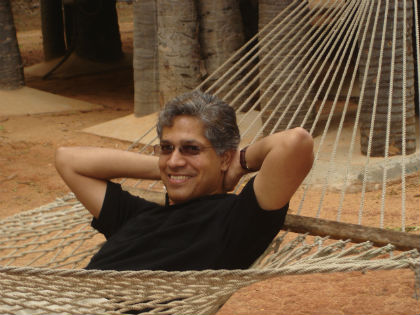Allow me to introduce Col. Mohan Vizhakat, a decorated veteran of Indian Army. His book “Ancients of Greater Bharat” is a sequel to his previous book “The Guardians of Karma”, but it is a complete book in itself. Reading “Ancients of Greater Bharat” made us regard highly of Col. Vizhakat as an author as well. His books, if marketed properly and reach to the right curious readers, are definitely meant to be bestsellers. Even though comparing two authors is like comparing chalk and cheese but, personally I see a worthy competitor of Amish Tripathi in Col. Vizhakat based on exploration of his work.

Col. Mohan Vizhakat – Author of – The Ancients Of Greater Bharat
Ancients of Greater Bharat made us curious to have a conversation with Col. Vizhakat and I am happy to serve the honour. Here is the Q/A session with him. Let us try to know more about him and his vision behind the book.
Much about my professional profile can be understood from my LinkedIn page as follows https://www.linkedin.com/in/vizhakat/. Personally I’ve been an avid reader of various scientific concepts, spirituality and philosophy.
I’ve always wanted to write, but could never do it so far due to professional commitments. It’s only lately that I decided – its now or never 🙂
Indian mythology has always fascinated me. I’m also fond of reading Science Fiction. I do believe that myths tend to develop based on some actual incidents or truths from the past. On the other hand, if our ancient epics are based on the pure imagination of writers like Vyasa, then also they’re too fantastic to be sidelined as mere myths.
Ancient Indian civilisation is indeed a mystery. We have highly sophisticated scriptures that contain profound insights but little or no archeological evidence, to support them. The farthest in terms of pre-historic archeology is ‘Indus valley’ and ‘Harappan’ civilisations. However surprisingly they don’t seem to have any clear relation to the Sanskrit based Vedic scriptures that’s part of Indian legacy. The so called ‘Aryan Invasion Theory’ which attempted to explain this has been debunked as flawed hypothesis propounded by British Raj, to help assert their dominance over India. Even though my books are fictions, they do attempt to provide a scientifically plausible alternative to many of these mysteries.
The idea took shape as I tried to conceptualise a Sci-Fi based context to Indian mythology. This is an area that most authors in India haven’t seriously explored so far, even though we have such rich legacy to inspire the same. On the other hand, you find virtually every Greek and Norse mythology has been explored from this angle by western authors and converted to major block-buster movies by Hollywood.
My books are clearly NOT about retelling of any mythological story or epic. They adopt mythological characters but the storyline is entirely new – with the theme being based on scientific interpretation and plausibility of various incidents within Indian scriptures.
Guess this is the toughest part – far more than writing the book. Not being from a background with any media exposure, it’s been virtually impossible to get attention of any decent publishers. Those who would consider it wanted money upfront before they would even read the excerpts!! Even though I could easily afford it, I didn’t want this to be a vanity type endeavour and so declined such predatory publishers, who seem to pray on authors alone for their survival. At last I was compelled to take the only course left – self-publishing.
Well, the cover art of the first book ‘The Guardians of Karma’ was a disaster – it doesn’t in anyway reflect the contents, nor is something that the targeted readers of the book would consider as appropriate for them. I had only reluctantly agreed to it as the publisher didn’t seem to have any better resource or options. You see, these books are likely to be appreciated only by somewhat mature, well-read, culturally sophisticated readers who seek intellectual stimulation and are prepared to boldly consider the angle of ‘why not’. It’s really not suitable for the ultra-religious/dogmatic types or quick-thrill seekers who’re swayed by peer/popular opinions alone.
The cover of the second book ‘Ancients of greater Bharat” is much better because I took a personal effort to build the artwork myself.
First book I didn’t – and it so turned out that the same didn’t reflect the book’s theme. As regards the second book, the self publication agency Notion Press offered two alternatives (for payment against the same), but both were awful. At last, I created the graphics myself and gave them. The only contribution in this regard from them was the title fonts.
My message to the potential readers is – if you are a mature, discerning and intellectually adventurous reader, please give it a shot. The story has multiple thematic layers – firstly it presents a plausible alternative prehistory of Bharat against ‘Aryan Invasion Theory’, secondly it offers a scientific context to the concept of human genesis from Indian mythological perspective, thirdly it attempts to explain prominent incidents of Indian mythology from a scientific angle and lastly it’s an entirely new line of mythological story (clear departure from retelling of conventional epics).
Few that come into my mind are ‘the close combat scene between Uma and Mahishasur’, ‘Lord Hanuman explaining the scientific basis of various myths’, ‘picturisation of the planet of Vaikunth’, and the last climax scene of ‘spiritual combat between Hara and Adi-Raksh’. I also liked to vividly narrate various scenes like Citadels of Trikuta and Lanka, Hyranyapura, Sutala etc.
That’s difficult for me to answer – anyone suitable I guess. Incidentally ‘Hara’ is just another name of ‘Lord Shiva’.
Guess it’s like one more step towards spiritual enlightenment 🙂
Totally impulsive, as it’s not my profession as such. It’s very difficult for me to actually start off. Once I do and the plot starts taking shape, I tend to get more and more involved – almost to the point of obsession.
Definitely Sci-Fi, followed up with spirituality (philosophically stimulating ones and not religious stuff) and fantasy/mythology. I also like to read about Advaith philosophy propounded by Adi-Shankara, Ramana Maharashi, Vivekananda etc
Sci-Fi writers like Arthur C Clarke and Issac Asimov.
None, as I’m heavily committed professionally. Bought ‘Origin’ from one of the airports but struggling to move beyond few chapters.
I tend to believe that my inspiration is not really based on any people, time or space – it’s perhaps a calling from beyond all that.
Guess ‘reading’, if it could be considered a hobby. I also like fiddling with the terrace garden at home in Bangalore.
All of our ancients scriptures say that nature is but just an extension of our own body. So preserving it is naturally incumbent for our very survival. In future, all advancement of human species will be defined by the extend to which we could co-exist with nature in its most basic form, yet retain the capability of complete mastery over it. The subject book is based on the premise that such might’ve already been the case during ancient times.
Who knows… However the books that I write may always be on the lines of prompting the readers to question the established convention and boldly ask – “Why Not”.
As regards IT, humanity is just in the process of taking baby steps. Over the coming decades, there may not be a separate subject of IT – as it would become an intrinsic part of virtually everything we deal with. If we attempt to predict our progression into far future, there may eventually be a time when all that we consider as technology today would become so subtle that they’ll be perfectly ingrained within the very fabric of nature around us. Once we understand the laws and intricacies of nature (which is far more superior to all the technology that we know of, till date) fully, artificial construction/fabrication of infrastructure, materials or devices (which is what we essentially mean by “technology” today) may no longer be necessary. The next level of advancement of our species over coming millennia may inevitably be beyond the frontiers of our limited senses and intellect.
Well, let me once again remind that the subject book assumes similar advancement during ancient times. After-all as per scriptures, progression of all life is a cyclical phenomenon.
I’m mulling over some ideas. If I do get about writing such a story, it’ll again be on completely unconventional lines.
Don’t really have any opinion as such. eBook is a natural evolution based on the IT-related advancements of our age. While it has empowered authors to self-publish easily, the result of that could also be that good quality content may get submerged among lots of mediocre ones.
Not necessarily. However, the times and traditions will and must naturally change. Earlier, grandparents used to be the conduit of tradition, wisdom etc from past generations. Now with the proliferation of media and information deluge, one would need to be intelligent and discerning enough to absorb the right stuff and reject wrong ones on his/her own.
LinkedIn: https://linkedin.com/in/vizhakat/
FaceBook: https://www.facebook.com/mohan.vizhakat
About Me: https://about.me/vizhakat
Twitter: @vizhakat
Over To You:
Hope you have enjoyed the Q/A session with him. And many of your questions might be already answered. Let us know that what do you think about this Interview session? Do you want us to ask anything else to him on your behalf? Do let us know. Also, let us know which other authors you like us to interview? Do let us know your thoughts and remarks via comments below. Do not forget to share this article with your friends over various social networks via Twitter, Facebook, Google Plus and others. And yes, you may like to subscribe to our RSS feeds and follow us on various Social networks to get latest updates for the site to land right in your mail box.
 ThinkerViews – Views And Reviews Personal views and reviews for books, magazines, tv serials, movies, websites, technical stuff and more.
ThinkerViews – Views And Reviews Personal views and reviews for books, magazines, tv serials, movies, websites, technical stuff and more.



